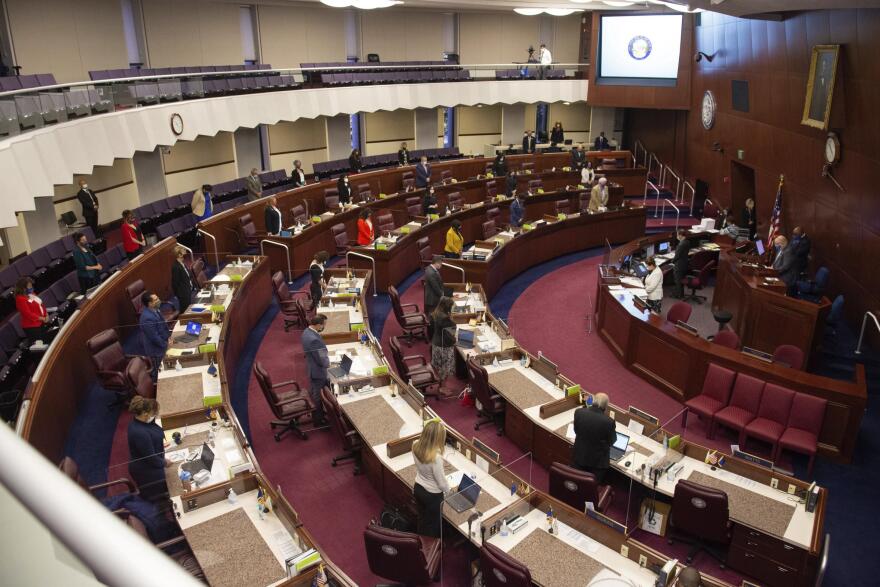The second special session of the summer just ended last night.
Lawmakers passed a series of bills, including COVID-19 liability protections and workplace safety standards, mail-in voting and police reform.
Activists have been calling for state leaders to change the way officers interact with the public and how they get investigated when they’re accused of misconduct.
Kendra Berschy is one of the people calling for changes. She's an attorney with the Washoe County Public Defender's Office. She, along with other advocates, sent an open letter to lawmakers asking for the repeal of SB242.
Known as the Peace Officers Bill of Rights, it passed in 2019 and gave extra protection to police officers during misconduct investigations.
Berschy said Senate Bill 2, which revised some of SB242, did not go far enough.
"What occurred in that bill is that it does take out some harmful provisions," she said, "It does allow impacted individuals to get access to some statements that may help in their pursuit of justice for their loved ones, but it doesn't do enough to ensure that officers who are engaged in misconduct are held accountable."
She also said the bill doesn't do enough to make misconduct investigations public. Berschy noted that the Minneapolis Police accused in the death of George Floyd had been the subject of several misconduct investigations before he killed Floyd but that information wasn't available to the public.
Berschy said Nevada has similar rules about misconduct investigations.
"The officers who are engaged in misconduct they have the ability through the union to hide that misconduct and shield them from liability, which unfortunately could lead to continued issues," she said.
She is hopeful that that part of the SB242 is addressed when the Legislature meets in the regular session in February.
Senate Majority Leader Nicole Cannizzaro sponsored SB242 in the 2019 legislative session. She oversaw the partial reform of the bill during this special session.
"I think that what you see is an effort to ensure we can hold officers accountable for not doing their jobs and then officers who are doing their jobs and doing them well can feel as though they can keep that job and keep doing it in a safe and efficient manner," Cannizzaro said.
Despite the explanation from Cannizarro, Berschy doesn't believe the changes made to SB242 do much to change the status quo.
"I don't think there was enough that changed in Senate Bill 2 to really say that there will be a difference even for the police officers who are being investigated," she said.
Berschy said there are still some issues within the Peace Officers Bill of Rights. She believes it allows officers to be shielded from liability and doesn't protect officers who are doing a good job.
A bill that advocates are more supportive of is AB3 which includes a number of reforms like a ban on police chokeholds and a guarantee of the right for the public to film police on duty.
Berschy said the ban on chokeholds was a step in the right direction and something the community had been demanding for a long time. Plus, she said the bill includes a definition of a chokehold and that is important in holding officers accountable.
Besides that, Berschy believes lawmakers got behind the reform because they made sense.
"But there were some other provisions that were actually just common sense," she said, "Like if an officer is involved in a death or an officer-involved shooting, absolutely they should be drug tested."
Nissa Tzun has been working on police reforms for 11 years. She is the co-founder of Force Trajectory Project.
She believes the timing was right for lawmakers to finally tackle some of the reforms she and others have been demanding for a long time.
"I think the killing of George Floyd has really created an opening for the discussion around policing and all the issues that come with it," she said, "I don't think without the George Floyd case happening during COVID times that would have been such attention on policing issues."
She said the national discussion about policing ebbs and flows, but right now, while it is ebbing, it is an opportunity to engage with the community and elected officials about the issues.
One of the problems with this special session, Tzun said, was that it happened so quickly that it didn't give lawmakers a chance to talk directly to people who have been impacted by police violence about what specific reforms were needed.
However, the people she works with, all of whom are either victims of police brutality or family members of victims, did put together a 40-point plan to improve police accountability and transparency.
"We did send those demands out to the Legislature and other federal elected officials. So, it does seem that they did address some of those issues in AB3," she said.
Kendra Berschy, attorney, Washoe County Public Defender's Office; Nissa Tzun, co-founder, Forced Trajectory Project









